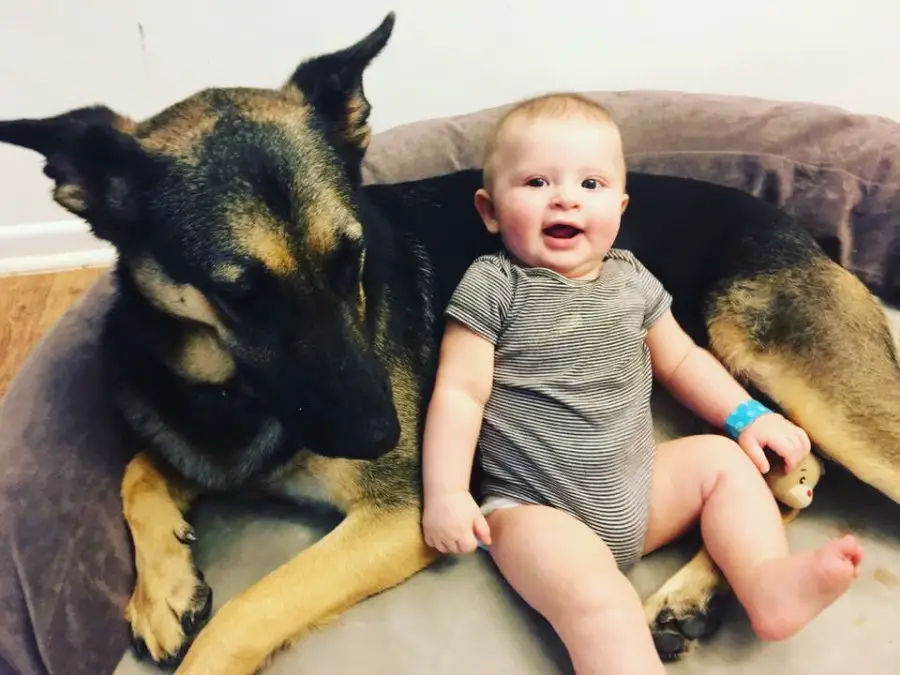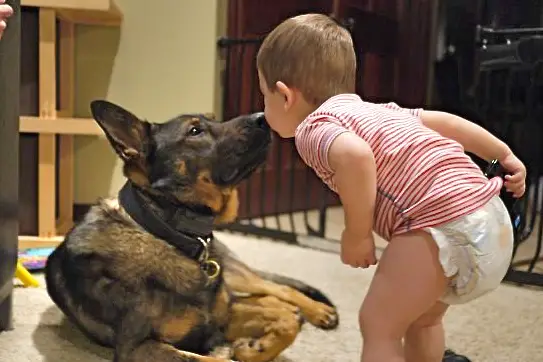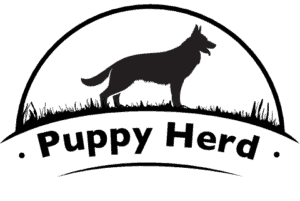German Shepherds are one of the most beloved dogs in the world. They are known for their obedience, curiosity, courage, alertness, and watchfulness. However, many people worry about what will happen when you bring a newborn child to a home with an already aged German Shepherd dog. Will they get along?
Your German Shepherd will get along with your newborn. Although the case might be different for older kids, German Shepherds are very protective of infants and toddlers. They tend to be gentle with infants and watch over them. Sometimes, they are even likely to protect children they aren’t familiar with.
Using this guide, you will be able to prepare yourself and your German Shepherd for a new family member. So, let’s dig in and find out how best to handle bringing a newborn home to a grown German Shepherd.
German Shepherds And Newborns
German Shepherds are one of the most intuitive dogs. As such, preparations to introduce your dog to your newborn should be done well in advance of the baby’s arrival. This will help make the transition a lot smoother and avoid jealousy or friction between the dog and your baby.
With the proper setting and guidance, German Shepherds can bond well with children and become their most prominent guardians and friends.

Dealing With Jealousy
Intelligent dogs such as the German Shepherd are social creatures. Therefore, in a home where it’s used to getting all the love and attention, you might notice a change in the dog’s personality upon the child’s arrival.
However, it all comes down to how well the dog is trained, how the home is set up, and how the entire situation is handled. You might notice the dog starting to act up so that they can get more attention or sometimes get over-excited or aggressive toward the baby.
Preparing For The Newborn
The most effective way to deal with jealousy issues is by addressing it before it develops. For a German Shepherd, this means establishing daily routines, setting limits, and getting into the right emotional space for the dog to tap into.
Here is what you can do:
- Set up the house a few weeks before the baby comes so that the dog gets used to the new layout of things and new sights such as the crib, baby toys, etc.
- Since newborns tend to cry a lot, you can get a crying doll. This way, your pet isn’t distressed when they first encounter it.
- Your German Shepherd should be up to speed with basic commands such as stay, leave, sit, come, drop it, and so forth. It helps especially when their toys start getting mixed up.
- Consult a behavioral specialist: Since the dog is part of the family, the ideal situation here is to make the transition smooth and effortless. This specialist is familiar with how dogs react, they can give you tips on adjusting.
- Setting clear limits and boundaries: German Shepherds are very obedient and highly trainable. Set no-go zones, like the nursery and other places. They will most likely obey.
- Let them get used to the scent: Make sure your dog becomes familiar with the baby’s scent before you bring your child home. You can do this by using a piece of clothing or a burp cloth.
- Behavior reinforcement and rules: Before the newborn gets home, the dog should be calm and well behaved. This means affirming their behavior regularly. Try correcting misbehavior, and rewarding submissive and passive behavior.
Introducing Your German Shepherd To Your Baby
Your baby just arrived, and despite all the preparation, you are still concerned about your dog’s reaction. That is normal. Introducing your German Shepherd to your baby is essential and should be done with care.
German Shepherd, like other big dogs, have a pack mentality. They know who is in charge, and that person should be obeyed at all times. However, they will, from time to time, look to challenge your authority and see what happens.
Once you have established that you are the alpha, you can proceed with the introduction. To make sure everything works out well, you may follow these steps:
- Before the newborn baby gets home, drain most of your dog’s energy by going for a walk or playing.
- The baby can be brought into the house when you are out with the dog.
- When you come back home, make sure that the German Shepherd is in a calm and submissive state before you enter.
- It’s also important not to get the dog too excited. The person holding the baby should be familiar with the pet, and they too must be calm and relaxed.
- From a safe distance, allow the dog to sniff and identify the baby’s scent.
- As time goes by, give your pet a chance to get closer to the baby. This bond will eventually enable the dog to acknowledge the baby is also a new master.
Managing Your German Shepherd Once The Newborn Is Home
After the initial introduction, there is still quite a lot to be done before baby and dog are fond of each other. You need to manage how the dog and the baby interact to ensure that everything stays in order.
Here are a few ways you can manage the German Shepherd once you have the newborn in the house:
- Always supervise the dog around a newborn or toddler.
- The initial interactions should always be closely monitored. Until you are sure that closer interactions are safe, ensure that the baby is not within pawing and mouthing distance.
- Dogs can be be quite territorial at times. Keep the baby’s and the dog’s spaces separate, so they won’t develop any issues that can bring problems.
- Babies are curious too, you’ll have to teach the baby not to pull on the dog’s ears, tail, or do anything to irritate the dog.
- Hygiene is paramount, especially in a home with a newborn. Make sure the dog is clean and properly groomed. Nails should be clipped frequently to avoid scratches.
- Make sure dog hairs and poop are cleaned up, to prevent a crawling baby from putting dirty things in their mouth.
- If there are areas of the house you would rather the dog not go in, you can get gates, which are quite effective.

Keeping Your German Shepherd Happy With A New Member Of The Family
Newborn babies can be quite the handful. Families with German Shepherds may tend to neglect the dog for a while, as most of their energy goes to taking care of the baby.
Even though you have a new member of the family, it’s important not to disregard your pet’s needs.
- Remember to socialize with the dog. Early and consistent socializing creates a happy, less temperamental dog.
- Stimulate the dog using exercise and other games. This keeps the dog happy and fit, and also reduces its energy and destructive potential.
- Give your dog the attention and love they deserve. When they feel a shift, they can get very temperamental with the object or person they view as the cause of the problem.
German Shepherds are great family pets. After bonding with your baby, their relationship will only get better as the child grows. German Shepherds can be great and loyal friends that protect their loved ones at all costs.
Sources:
- Anything German Shepherd: Are German Shepherds Safe With Babies
- Puppy Wire: Are German Shepherds Good with Kids and Babies?
- Total German Shepherd: Introducing Your Dog and Your Baby
- The Daily Shep: Tips For Introducing Your German Shepherd To Your Newborn Baby
- Shepped: How To Introduce Your Baby To Your Dog
